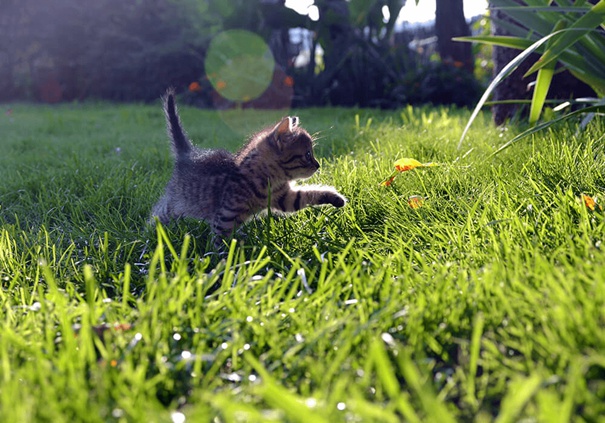Can lost cats find their way back home?
It is essential to understand how a cat’s territory is structured to grasp how cats always manage to find their way back home. In this article, we will first explain the territory, then give you some tips and tricks to help your cat keep its bearings, even in case of a move, so that you never lose your pet.

Reading time : 6 min
Can cats ever get lost? A cat's ability to find their way home is puzzling to both their family and veterinarians. A common misconception is that all lost cats will always find their way back home, which is true most of the time.
Sometimes, however, a cat’s strong sense of smell is not enough to help them find their way, which might result in your cat getting lost. Apart from the fact that they may be injured or even killed, cats may encounter difficulties that will prevent them from finding their way back home.
Do cats always come back? How do they find their way around? It is fascinating to understand a cat’s behaviour and understand what leads a cat to act one way and come back home… or not.
TOPICS
Can cats find their way home?

The different parts of a cat’s territory
A cat's territory is usually between 40 and 200 metres from the house, but it can extend to several square kilometres. Cats will divide their territory by:
- Where they sleep. A spot where they can take naps and relax, most of the time delimited by scratches.
- Where they hunt. It can be extended if there is not enough prey or if there are other cats in the area.
- Where they go potty. This zone can be replaced if it becomes too dirty.
- Where they walk, usually defined by their facial glands.
The role of pheromones in cats’ orientation
Pheromones are chemical signals that work outside of the body that a lot of animals use to communicate or mark their territory. They also have a reassuring and soothing virtue. In cats, they are located in glands around the cheeks and chin so, when your cats rub their faces against furniture, they are marking their territory. If they rub their faces on you, they mark you as part of their social group.
By urinating, scratching, and rubbing their faces around their territory, the cat would have spread pheromones which will then guide them home. A cat’s strong sense of smell is fundamental for their survival and plays an essential role in their homing instinct.
A cat can smell pheromones thanks to the Jacobson’s organ located on the roof of their mouth. If your cat is making a funny disgusted-looking grimace, known as the flehmen response, it is actually trying to smell and taste (at the same time!) the surrounding pheromones.
After how long can I let my kitten go outside?

Even if a kitten looks independent from their mother, they are still very vulnerable to outside dangers. As their owner, you must protect your kitten against the outside world and wait until they are grown enough to face it.
Why are lost kittens at higher risks of getting hurt?
When a kitten is between 3 to 12 weeks old, they are in their social phase. Their mother will teach kittens how to fend for themselves and the kittens will mimic her, making them depend on her and thus be more fragile on their own.
Precautions to take before letting a kitten outside
A kitten is more impressionable than an adult cat, so they could get lost more easily if scared or surprised. Even more if their environment is unknown. It is then important to keep kittens inside so they can familiarise themselves with their environment.
Once the kitten is vaccinated and microchipped, they can be left to explore the garden under supervision. Only take your cat out if they are wearing a leash. These precautions will help to transform a timid kitten into a proud and lively cat, thus limiting the risk of disappearance.
Find out the 5 most important steps to find your lost pet
All the information you need to find your beloved companion
When to let a cat outside after a move?

Moving houses can be a stressful situation for a cat. As opposed to dogs who rely on their pack and thus their owners, all cats are territorial animals. Taking them away from their territory and putting them in a new one can be very stressful. They will have to acclimatise to this new place, which will make them panic more than it will soothe them.
Why should you leave your cat indoors after a move?
It is essential to keep a cat indoor after a move to let them acclimatise, get to know their new environment and spread their pheromones to create a new territory. If you let your cat outside, they could decide to leave because they don’t like their new environment. A runaway cat could then go and find a new family and never come back. Be careful with a cat flap, that should stay locked during a certain period of time.
If your cat is more of a homebody, moving won’t be much of a problem. Some breed like the Persian, Siamese, Ragdoll, Devon Rex, or the Birman love to stay inside. But if these types of cats were to find themselves outside, there are more chances of them getting lost since they would not have made time to go explore their new environment.
How to help your cat become familiar with their new environment?
You should let your cat wander and discover the new place without stopping them. They will need to explore every room, even ones that they will not return to later.
Also, it goes without saying that the frightened and fearful cat will need to find what used to be in their former home. Make sure that the bag of kibbles is always full, their cat food and water bowl filled regularly, and all their other specific needs met. It is also important to be attentive to the cat and to pet them to reassure them as much as possible.
Besides, the loss of visual and olfactory cues can lead to stress and cause your cat to forget about cleanliness for a while. Therefore, their litter box must be constantly clean but, above all, in plain sight. Do not hesitate to put more than one if the new home is much larger than the previous one.
How to get your cat to come home?

It is not easy to look for a cat when they are not home, let alone find them. It is important to note that even if it calms them down, neutering does not prevent cats from going outside. Even when spayed or neutered, a cat who is free to go outside enjoys walking, climbing, hunting, and even more finding a hiding place to rest. They can therefore be anywhere.
A GPS tracker to find a lost cat
A GPS tracker works with a sim card in conjunction with a free smartphone app and is therefore very useful as it allows you to locate lost animals very easily. With a GPS tracker for cat, you won’t need to shout to call your lost pet, who might be stuck or in hiding. You won’t need to walk through the neighbourhood at random without knowing where to look.
With the real-time tracking function and no distance limit, the mischievous feline won't be able to escape your vigilance. You can follow their movements and know their exact position in real-time. If your cat takes a long time to return, just follow their movements and go and look for them.
How to get your cat used to recall with the GPS tracker?
How to get your cat used to go outside and come back? It is totally doable to get your cat to come back to you by calling their name. However, if your cat is out of ear range, the recall function of the GPS tracker makes sense and is therefore not trivial at all. Indeed, this function allows you to condition your cat to return to the call.
To do so, simply activate the ringtone or vibration mode of the GPS Cat Tracker from your smartphone app as soon as the cat eats repeatedly throughout the day. When your cat goes to their bowl, the ring or vibrate mode should be triggered. The aim is for the cat to assimilate the ringing or vibration of their GPS tracker with food.
This way, when it is getting late or if you think your cat is taking too long to come back, simply activate the transmitter to trigger the ringing or vibration of the GPS tracker and your cat will come home without delay to enjoy a bowl of kibble.
Conclusion
Cats have a well-founded reputation for rarely getting lost. And for good reason, they are fiercely vigilant about their territory, which they cover as often as possible and which they know to perfection. However, despite their instinct and innate sense of direction, it can happen, unfortunately, that a cat gets lost. An unusual circumstance or a frightening situation can make a cat lose their bearings.
Therefore, it is important, when moving to a new house, that you help your cat immerse themselves in the new territory. Your cat must recreate the olfactory signals that reassure and soothe them, discover this new environment and make it their own. This takes a little time, which is why it is important to keep your cat indoors for a certain period of time for their safety.
Continue reading our guide
This article is part of a complete guide on the subject. Do not miss the next chapters.
How to find a lost pet ?
Discover the 5 most important steps
All the information you need to find your beloved companion


